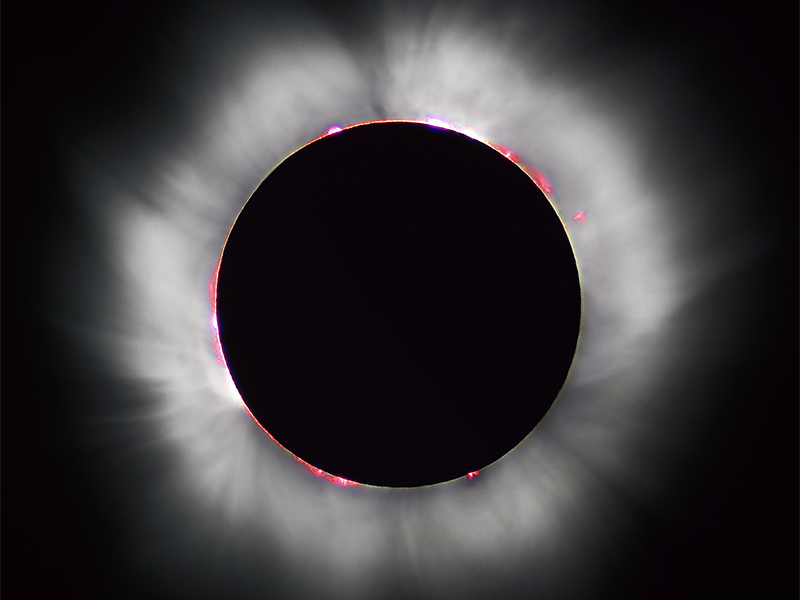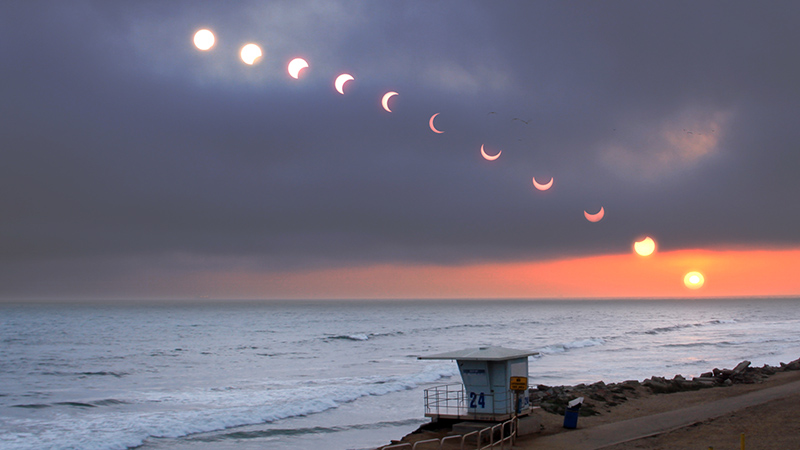(RNS) Have you gotten your official eclipse-viewing gear yet?
Call it free celestial entertainment. That is how The New York Times described a solar eclipse in 1925 — as “the most magnificent free show nature presents to man.” That show is coming, again, on Monday (Aug. 21).
But, for our ancestors, an eclipse was not a show.
It was a cosmic event.
RELATED: Signs and wonder: How people of different faiths view the total solar eclipse
Kings trembled when they saw an eclipse. In the Bible, King Hezekiah was on his deathbed. He prayed for healing — and as a sign that he would be healed of his illness, God sent a sign, in the form of a shadow that fell upon his house.
Astronomers know that on March 5, in 702 B.C, which was 15 years before the king died, there was a solar eclipse that could be seen throughout the Middle East.
Hezekiah was lucky. Other kings weren’t. The son of Charlemagne, Louis, most likely died after the eclipse of May 5, 840. The French king, Louis XIV, the “Sun King” who chose the sun as his emblem, ironically died right after an eclipse.
No wonder that Shakespeare thought that an eclipse was a “stain on the sun that portended no good.”
Likewise, our Jewish ancestors were afraid of eclipses. The sages of the Talmud were sure that it was human behavior — human sinfulness, to be exact — that caused eclipses.
What is it about eclipses that captures our imagination?
The darkness of the sun arouses the worst of our primitive fears — that the sun is leaving, and that the darkness will be permanent. For that is the origin of the word “eclipse.” It comes from the Greek word for “abandonment.”
Judaism understands, and responds to, the fear.
Whenever I pray the evening prayers, I realize why they are there.
To help us cope with our fear of the night.
“God rolls light in front of darkness and darkness in front of light, and causes day to pass and brings on the night.”
Have no fear. It is God — and not a demon — who creates the night. God will bring back the day, as well.
Try reading the Hebrew.
Maariv aravim
Shearim
Mishaneh itim
Machalif hazmanim
Mesader
B’mishmoroteyhem
The most dominant letter in those words is the letter M — “mem” in Hebrew.
The word for mother, in most languages, begins with the letter M. Because M is the sound of comfort.
Yes, the night is here, but do not fear.
And then, divine love.
“With an eternal love You love us” — not a love that might disappear in the wee hours. God is our night light.
And then: “Lie us down in peace and raise us up again.” Night is the time for the human enemy and for plague and war and hunger and sorrow.
There are night demons, we thought — and perhaps we still think. There are forces within us that drive us to evil or to the animal pieces of our souls — and we feel those forces most acutely at night.
This summer, we lost one of America’s most brilliant sociologists, Peter Berger.
In his book A Rumor of Angels, Berger writes of the child who wakes up in the middle of a nightmare. His mother runs to comfort him. “There, there. There, there. Everything will be alright.”
Berger asks the question: Can she really be sure that everything is going to be alright? Or is that statement an act of faith?
It is an act of faith because it is a faith in the unseen. To enter the night is an act of faith.

This total solar eclipse in 1999 occurred when the moon completely covered the sun’s disk. Photo courtesy of Oregon State University
Which brings us to God.
There is evil in the world. This past week we were forced to remember that.
So, where is God?
The great theologian Martin Buber taught that God is hiding the divine face; that God, like a divine parent, plays peek-a-boo with the world; that we are living through a time of the eclipse of God.
It is a biblical idea that first makes its appearance in Deuteronomy. The prophet Isaiah understood it: “You are a God Who conceals himself!” the prophet exclaims. (Isaiah 45:15)
Just as we fear the disappearance of the sun, we fear the disappearance of God. Yes, God is there, but we are not feeling it.
During the Shoah, a Jew in Cologne wrote these words on a cellar wall:
I believe in the sun
even when it is not shining
And I believe in love,
even when there’s no one there.
And I believe in God,
even when he is silent.
But, now I want to pick a fight with this theology.
As compelling as it might sound, and as powerful as the image might be, I do not believe that God is in eclipse when evil happens.
What went into eclipse in Charlottesville, and in the days after Charlottesville?
- The human conscience.
- Human decency.
- The ethics of historical memory.
- Any sense of moral leadership from the White House.
And what has gone into eclipse, in the wake of the terror attacks in Barcelona?
No, not God.
Sanity itself. Perhaps, even civilization itself.
It is not human sinfulness that creates eclipses (as the sages taught; that is why there is no Jewish blessing for the sighting of an eclipse).
Rather, human sinfulness pushes our own humanity into eclipse.
Rabbi Nachman of Bratslav was one of the most influential Hasidic teachers. He was a man who struggled with his own inner darkness, with the presence of God who seemed regularly to be in eclipse.
There is a popular Israeli song that is based on his words:
Our Father in Heaven says to us,
“Children, I will conceal Myself on that day,”
Even in a concealment within a concealment,
The Lord, may He be blessed, is certainly there
And behind the difficult things that stand before you,
I stand, I stand, I stand.
And yet — the Hebrew word for “darkness” is “shachor.” The Hebrew word for “dawn” is “shachar.”
Perhaps it will yet be true — that the shachor of the human soul in eclipse will wane, and bring moral shachar in its wake.






